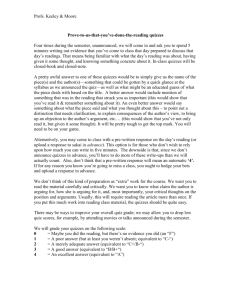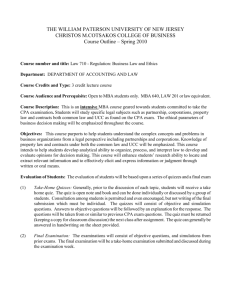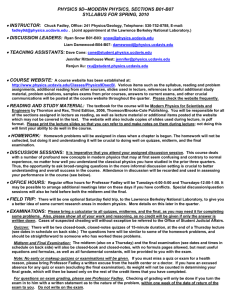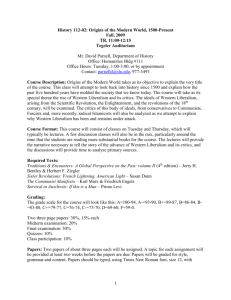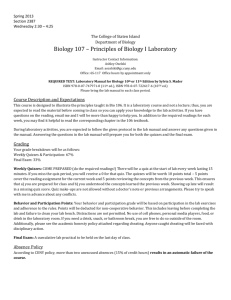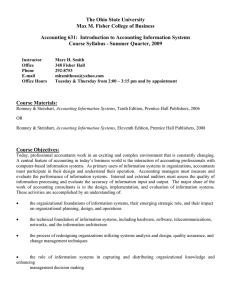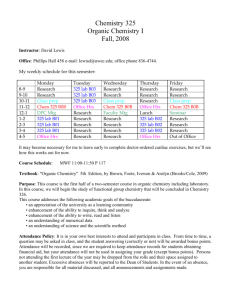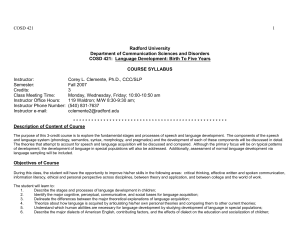INTERNATIONAL MANAGEMENT (MGT 4030)
advertisement
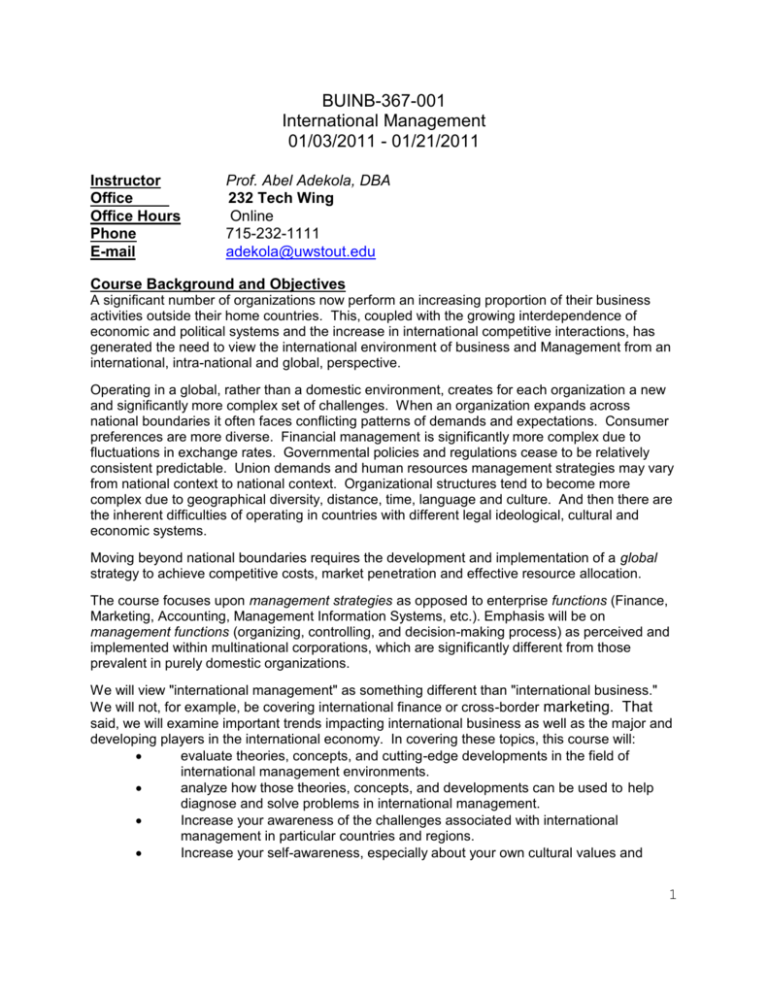
BUINB-367-001 International Management 01/03/2011 - 01/21/2011 Instructor Office Office Hours Phone E-mail Prof. Abel Adekola, DBA 232 Tech Wing Online 715-232-1111 adekola@uwstout.edu Course Background and Objectives A significant number of organizations now perform an increasing proportion of their business activities outside their home countries. This, coupled with the growing interdependence of economic and political systems and the increase in international competitive interactions, has generated the need to view the international environment of business and Management from an international, intra-national and global, perspective. Operating in a global, rather than a domestic environment, creates for each organization a new and significantly more complex set of challenges. When an organization expands across national boundaries it often faces conflicting patterns of demands and expectations. Consumer preferences are more diverse. Financial management is significantly more complex due to fluctuations in exchange rates. Governmental policies and regulations cease to be relatively consistent predictable. Union demands and human resources management strategies may vary from national context to national context. Organizational structures tend to become more complex due to geographical diversity, distance, time, language and culture. And then there are the inherent difficulties of operating in countries with different legal ideological, cultural and economic systems. Moving beyond national boundaries requires the development and implementation of a global strategy to achieve competitive costs, market penetration and effective resource allocation. The course focuses upon management strategies as opposed to enterprise functions (Finance, Marketing, Accounting, Management Information Systems, etc.). Emphasis will be on management functions (organizing, controlling, and decision-making process) as perceived and implemented within multinational corporations, which are significantly different from those prevalent in purely domestic organizations. We will view "international management" as something different than "international business." We will not, for example, be covering international finance or cross-border marketing. That said, we will examine important trends impacting international business as well as the major and developing players in the international economy. In covering these topics, this course will: evaluate theories, concepts, and cutting-edge developments in the field of international management environments. analyze how those theories, concepts, and developments can be used to help diagnose and solve problems in international management. Increase your awareness of the challenges associated with international management in particular countries and regions. Increase your self-awareness, especially about your own cultural values and 1 perspectives as they relate to international business environment. What Will Happen in the Course Throughout the Winterm, a mixture of things will happen in course. As a result, it is critical that you read the text and other assigned readings which are your fundamental sources of understanding the international environment of firms and management. Required Readings Adekola, A & Sergi, B (2007) Global Business Management: A Cross-Cultural Perspective Hampshire, England: Ashgate Publishing Limited A variety of handouts will also be assigned to be read. Course Requirements Please pay specific attention to the following instructions: 1. Five Quizzes This is a multiple choice/TF quizzes (20 points each) you need to take the quizzes at the designated time of 6pm -6:30 pm ONLY. 2. Midterm Examination This is a multiple choice examination. You need to take the 3. quizzes at the designated time of 6pm -6:40 pm ONLY. Final Examination This is a combination of multiple choice and short essay examination. You need to take the quizzes at the designated time of 6pm -6:40 pm ONLY. 4. Group case write ups Case write ups are designed to illustrate how various ideas and concepts presented in the assigned readings can be used to address international management problems. Please pay specific attention to these General Guidelines for Case Write-ups & Submissions: Each group must analyze 2 cases by choosing any two from cases 4-8. Cases 2 & 3 are analyzed as examples for your perusals only and not to be analyzed. Also note that there is no Case 1 in the lineup. Case write-ups must be prepared by each group and directly answer all of the specific questions relating to the assigned cases. *One Submission per group in the drop box-You should designate a group member to submit your two chosen analyzed cases. Before answering the case questions, please address the followings: Focus Objectives Case Setting Major players-organizations and People Key Terms Then answer the case questions. Note for Group Assignment: After couple of warnings and after being brought to my attention, you could fire a group member that fails to meaningfully participate in the case or the group project. In such a situation, you should not include such group member’s name in your submission(s). Grades will be based on a 200-point system 2 5 Quizzes (20 points each) Midterm Exam Final Exam 2 Group case write-ups 100 20 30 50 50% 10% 15% 25% Total Possible: 200 pts 100% Course Policies Academic dishonesty in all forms will be dealt with swiftly and severely. That includes all forms of cheating, plagiarism, and collaboration on quizzes and exams. The minimum penalty will be an “F” for the course. My advice: Just do the work! Grading Scale: Grade Scale A 94-100% A- 90-93% B+ 86-89% B 84-85% B- 80-83% C+ 77-79% C 74-76% C- 70-73% D+ 66-69% D 63-65% D- 60-61% F below 60% Definition of grades and workload expectations A -- Achievement that is outstanding relative to the level necessary to meet course requirements. B -- Achievement that is significantly above the level necessary to meet course requirements. C -- Achievement that meets the course requirements in every respect. D -- Achievement that is worthy of credit even though it fails to meet fully the course requirements. S -- Achievement that is satisfactory, which is equivalent to a C- or better (achievement required for an S is at the discretion of the instructor but may be no lower than a C-). F (or N) -- Represents failure (or no credit). 3 WinterM 2011 COURSE SCHEDULE MODULES 01/03 – ACTIVITIES Course overview - Global Business Trends & Fundamentals 01/04 Topic: Managing on a global stage: Chapter 1 Lecture Chapter 1 Questions- Exercise Topic: Changes and Growth in the International Marketplace – Chapter 2 Chapter 2 Questions Exercise Quiz 1 – January 05 6: pm – 6:30 am 20 points 01/06 Topic: An Introduction to Multinational Enterprises – Chapter 3 Chapter 3 Questions Exercise Case 2 – Chiba International, Inc Sample_1 01/05 01/07 Topic: Impact of Economics and Monetary Framework - Chapter 4 Chapter 4 Questions Class Exercise Case 3 – Grupo Financiero Inverlat Sample_2 Quiz 2 – January 07 20 points 01/10 Topic: Impacts of Domestic Politics on International Business – Chapter 5 Chapter 5 Questions Exercise Case 4 – Contract Negotiations in West Africa Due March 4 Topic: Culture Defined-Perceptions & attitudes across cultures – Chapter 8 Chapter 8 Questions Class-Exercise Case 5 – Go Global-or No? Quiz 3 – January 11 20 points 01/12 Topic: Impact of Culture on International Management – Chapter 9 Chapter 9 Questions Exercise Case 6 – Trouble in Paradise 15 points MIDTERM Examination January 12 on Chapters 1 – 5 and class discussions 01/11 01/13 Topic: Information Technology impact on International Management – Chapter 6 Chapter 6 Questions Exercise Case 7 – The Case of the Floundering Expatriate 01/14 Topics: International Service Management –Chapter 7 Chapter 7 Questions Exercise Case 8 - In a World of Pay Quiz 4 – January 14 20 points 01/18 Topics: Cross Cultural Training and Expatriate Assignments – Chapter 10 International Development: Culture Knowledge & Chapter10QuestionsExercise 01/19 Lecture on Motivation & Leading Across Cultures 01/20 Quiz 5 – Jan 20 20 points 01/21 Final Examination 30 4


